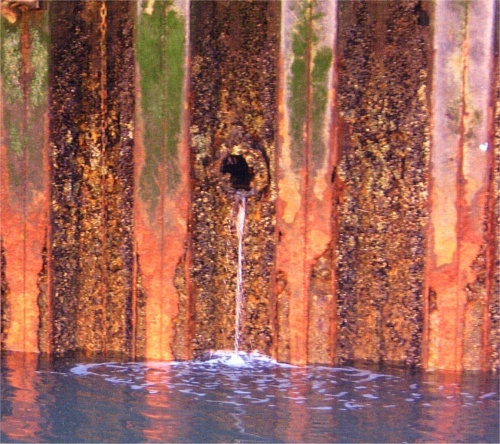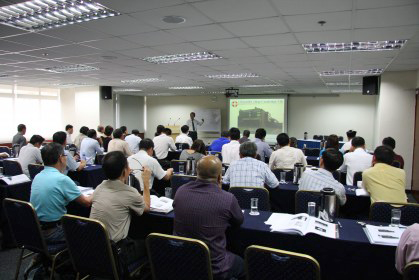|
 |
|
Home |
Consulting |
Training |
Expert Witness |
Failure Analysis |
Design Review |
Corrosion Test |
Corrosion Software |
Protective Coatings |
Materials Selection |
Cathodic Protection |
>>> |
|
Marine Corrosion: Causes and Prevention |
|
Course Outline |Who Should Attend |Registration |In-House |On-Demand |Online Courses |PPT Slides+Testbank |Course List
|
Why WebCorr
|
|
Course Overview |
|
 This corrosion course aims to provide the
participants with a thorough understanding of the causes of corrosion in
the marine environments and the technical know-how of corrosion control
and prevention. Upon completion of this short course the participants
will be able to identify different forms of corrosion, analyze the root
causes of corrosion failures, select appropriate materials for
applications in the marine environments, specify and apply proper
protection methods against marine corrosion. This corrosion course aims to provide the
participants with a thorough understanding of the causes of corrosion in
the marine environments and the technical know-how of corrosion control
and prevention. Upon completion of this short course the participants
will be able to identify different forms of corrosion, analyze the root
causes of corrosion failures, select appropriate materials for
applications in the marine environments, specify and apply proper
protection methods against marine corrosion.
This corrosion short course is
available for in-house training, online and distance learning worldwide.
It can also be customized to meet the specific needs of your
organization.
|
|
|
|
Course Outline |
|
|
|
1. Corrosion and the Marine Environment
1.1 Classification of Corrosion and the Marine Environments
1.2 Corrosion: its economic, social, environmental and
political Impact
2. Marine Corrosion: Terminology & Convention
2.1 Effect of moisture and oxygen
2.2 pH and potential-pH diagram (Pourbaix diagram)
2.3 Effect of chloride
2.4 Conductivity, anode, cathode, galvanic cell, corrosion
cells, aeration, passivity, etc.
3. Why Do Metals Corrode
3.1 Thermodynamic aspects of corrosion
3.2 The effect of environment
3.3 The driving force of corrosion
4. How corrosion occurs in the marine environments
4.1 The reaction of a metal with electrolyte
4.2 The electrochemical nature of corrosion
4.2.1 the reaction of a
metal with its environment
4.2.2 the mixed potential
theory
4.2.3 polarization and
corrosion rate
4.2.4 passivation and its
breakdown
4.3 The characteristics of marine environments
4.3.1 corrosivity of
seawater
4.3.2 corrosivity of
marine atmospheres
4.4 Factors affecting marine corrosion
4.4.1 salinity and
chlorinity
4.4.2 temperature,
dissolved gases, velocity, pH, pollutants, biological organisms
4.4.3 relative humidity,
airborne contaminants etc.
4.5 Common forms of marine corrosion
4.5.1 uniform corrosion
4.5.2 galvanic corrosion
4.5.3 dealloying
4.5.4 crevice corrosion
4.5.5 pitting corrosion
4.5.6 intergranular
corrosion and weld decay
4.5.7 exfoliation
4.5.8 stress corrosion
cracking
4.5.9 hydrogen related
damages
4.5.10 erosion corrosion
and cavitation damage
4.5.11 microbiologically
influenced corrosion (MIC)
4.5.12 stray current
corrosion
4.5.13 biofouling
4.6 Corrosion resistance of steels and alloys in the marine
environments
5. How to control and prevent corrosion
5.1 Materials selection for corrosion prevention
5.2 Design against corrosion
5.3 Theory and practice of cathodic protection
5.4 Theory and practice of corrosion inhibitors
5.5 Theory and practice of metallic coatings
5.5.1 thermal spray,
metallization
5.5.2 hot-dip galvazing
5.5.3 conversion coatings
(anodizing, chromating and phosphating)
5.5.4 electroplating,
electroless plating, immersion plating.
5.6 Theory and practice of organic coatings
5.6.1 composition and
characteristics of paints
5.6.2 types of paints
5.6.3 protective coatings
for marine applications
5.6.4 paint failures
5.6.5
environment-friendly anti-fouling paints ("green" coatings)
5.6.6 coatings and
cathodic protection for marine structures
5.7 Theory and practice of plastic coatings
5.8 Theory and practice of concrete coatings
6. Corrosion Testing and Monitoring
|
|
Course Outline |Who Should Attend |Registration |In-House |On-Demand |Online Courses |PPT Slides+Testbank |Course List
|
|
Who Should Attend
This Corrosion Course |
|
Corrosion practitioners, designers, architects, technical managers, inspection
and maintenance engineers, quality control personnel, owners and operators of
marine structures, vessels and facilities, and those involved in
failure analysis.
Successful completion of this corrosion course helps participants
prepare for their NACE certification examinations at the Corrosion Technician,
Corrosion Technologist and Senior Corrosion Technologist levels.
|
|
Registration
for This Corrosion Course |
-
Click
here to register for this corrosion course online,
or
-
Click
here to download this corrosion course brochure with
registration form in PDF format.
|
|
In-House Training Corrosion Courses and
On-Site Corrosion Courses |
|
 If you are concerned with corrosion in your
company, in-house training or on-site training is a great solution to train a group of
employees from design, production, operation, quality assurance, inspection
and maintenance, and technical sales and support on corrosion control and
corrosion prevention technology. The contents of all our corrosion courses can
be customized to fit your organization's needs. If you are concerned with corrosion in your
company, in-house training or on-site training is a great solution to train a group of
employees from design, production, operation, quality assurance, inspection
and maintenance, and technical sales and support on corrosion control and
corrosion prevention technology. The contents of all our corrosion courses can
be customized to fit your organization's needs.
There is no limit to the number of participants required for
in-house training corrosion courses. We conduct the in-house training
corrosion course at your company's premises worldwide, and at a time convenient to
your company.
Click
here to contact us
for a quotation for in-house training corrosion courses. |
|
Corrosion
Course-On-Demand |
|
 All our publicly scheduled corrosion short courses are conducted once a year. However, you do not need to wait for one year if you have missed any of the publicly scheduled corrosion courses as we have this unique corrosion course-on-demand scheme: we will conduct the course just for you
(on an one-on-one basis) or for a small group from your company at a time and in a location convenient to you. This option costs significantly less than a full-scale in-house
or on-site corrosion training program. All our publicly scheduled corrosion short courses are conducted once a year. However, you do not need to wait for one year if you have missed any of the publicly scheduled corrosion courses as we have this unique corrosion course-on-demand scheme: we will conduct the course just for you
(on an one-on-one basis) or for a small group from your company at a time and in a location convenient to you. This option costs significantly less than a full-scale in-house
or on-site corrosion training program.
Click
here to contact us for a quotation. |
|
Online and Distance Learning Corrosion
Courses |
|
 All
our corrosion short courses are available for online or offline distance
learning. You can start an online corrosion course at any time and learn
at your own comfortable pace and schedule, whenever and wherever you
are. You have around-the-clock access to the interactive and media-rich
course materials, virtual labs, course instructions and course assessments. Discussions and questions related to the corrosion courses
are posted on the website or exchanged through email for a period up to 3 months. Video conferencing or instant messaging can also be arranged for discussions of course topics.
For those who do not have ready access to internet, we can send
you our online course materials on a CD-ROM, or DVD, or USB flash drive for offline
distance learning. All
our corrosion short courses are available for online or offline distance
learning. You can start an online corrosion course at any time and learn
at your own comfortable pace and schedule, whenever and wherever you
are. You have around-the-clock access to the interactive and media-rich
course materials, virtual labs, course instructions and course assessments. Discussions and questions related to the corrosion courses
are posted on the website or exchanged through email for a period up to 3 months. Video conferencing or instant messaging can also be arranged for discussions of course topics.
For those who do not have ready access to internet, we can send
you our online course materials on a CD-ROM, or DVD, or USB flash drive for offline
distance learning.
Click
here to to register an online corrosion short course. |
|
|
|
PowerPoint Slides and Test Banks for Trainers,
Instructors, Tutors, University Lecturers and Professors |
|
If you are involved in teaching or
training, you may wish to purchase a complete set of the trainer's
package for this training course. The trainer's
package comes complete with ready-to-use PowerPoint slides (fully
editable) and test bank (with answer keys). These ready-to-use
PowerPoint slides contain high quality color photographs, illustrations,
animations, audio and video clips. The test bank contains questions
in four categories: (1) true or false, (2)
multiple choice, (3) calculation, and (4) reasoning and open-ended
discussions. The trainer's package is suitable for in-house training and
university teaching. This is exactly the same package that WebCorr uses to deliver our
current training course.
The one-time lump sum fee allows your
organization to use the training package and also modify it. For
example, your organization may modify the course contents and
re-name/re-brand the course under your organizationís name. WebCorr only
retains the copyright of the original PowerPoint slides and test bank.
Click
here to contact us if you need more information on the trainer's package.
|
|
Course Outline |Who Should Attend |Registration |In-House |On-Demand |Online Courses |PPT Slides+Testbank |Course List
|
|
Home |
Contact Us |
Copyright
©
1995-2025.. All rights reserved. |
 This corrosion course aims to provide the
participants with a thorough understanding of the causes of corrosion in
the marine environments and the technical know-how of corrosion control
and prevention. Upon completion of this short course the participants
will be able to identify different forms of corrosion, analyze the root
causes of corrosion failures, select appropriate materials for
applications in the marine environments, specify and apply proper
protection methods against marine corrosion.
This corrosion course aims to provide the
participants with a thorough understanding of the causes of corrosion in
the marine environments and the technical know-how of corrosion control
and prevention. Upon completion of this short course the participants
will be able to identify different forms of corrosion, analyze the root
causes of corrosion failures, select appropriate materials for
applications in the marine environments, specify and apply proper
protection methods against marine corrosion. If you are concerned with corrosion in your
company, in-house training or on-site training is a great solution to train a group of
employees from design, production, operation, quality assurance, inspection
and maintenance, and technical sales and support on corrosion control and
corrosion prevention technology. The contents of all our corrosion courses can
be customized to fit your organization's needs.
If you are concerned with corrosion in your
company, in-house training or on-site training is a great solution to train a group of
employees from design, production, operation, quality assurance, inspection
and maintenance, and technical sales and support on corrosion control and
corrosion prevention technology. The contents of all our corrosion courses can
be customized to fit your organization's needs.
 All our publicly scheduled corrosion short courses are conducted once a year. However, you do not need to wait for one year if you have missed any of the publicly scheduled corrosion courses as we have this unique corrosion course-on-demand scheme: we will conduct the course just for you
(on an one-on-one basis) or for a small group from your company at a time and in a location convenient to you. This option costs significantly less than a full-scale in-house
or on-site corrosion training program.
All our publicly scheduled corrosion short courses are conducted once a year. However, you do not need to wait for one year if you have missed any of the publicly scheduled corrosion courses as we have this unique corrosion course-on-demand scheme: we will conduct the course just for you
(on an one-on-one basis) or for a small group from your company at a time and in a location convenient to you. This option costs significantly less than a full-scale in-house
or on-site corrosion training program. All
our corrosion short courses are available for online or offline distance
learning. You can start an online corrosion course at any time and learn
at your own comfortable pace and schedule, whenever and wherever you
are. You have around-the-clock access to the interactive and media-rich
course materials, virtual labs, course instructions and course assessments. Discussions and questions related to the corrosion courses
are posted on the website or exchanged through email for a period up to 3 months. Video conferencing or instant messaging can also be arranged for discussions of course topics.
For those who do not have ready access to internet, we can send
you our online course materials on a CD-ROM, or DVD, or USB flash drive for offline
distance learning.
All
our corrosion short courses are available for online or offline distance
learning. You can start an online corrosion course at any time and learn
at your own comfortable pace and schedule, whenever and wherever you
are. You have around-the-clock access to the interactive and media-rich
course materials, virtual labs, course instructions and course assessments. Discussions and questions related to the corrosion courses
are posted on the website or exchanged through email for a period up to 3 months. Video conferencing or instant messaging can also be arranged for discussions of course topics.
For those who do not have ready access to internet, we can send
you our online course materials on a CD-ROM, or DVD, or USB flash drive for offline
distance learning.